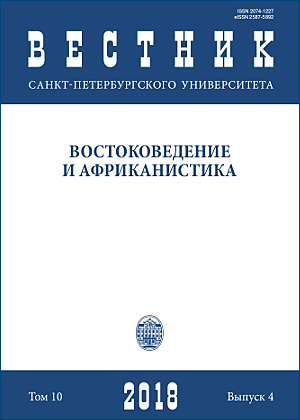Stages and perspectives of the development of Dhāraṇī Studies as a branch of Buddhist studies
DOI:
https://doi.org/10.21638/spbu13.2018.409Аннотация
Статья посвящена анализу смены методологических подходов к изучению практики рецитации сакральных возглашений (дхарани) в буддизме. Автор статьи выделяет три этапа изучения буддийских сакральных речитативов с нач. XIX в. вплоть до наших дней. Так, первый этап (нач. XIX в. — первая треть XX в.) характеризуется тем, что изучение текстов, содержащих дхарани, происходит в рамках публикации буддийских письменных памятников в целом. Автор статьи указывает на значительный вклад акад. В. П. Васильева в изучение дхарани: идеи относительно изучения буддийских речитативов, сформулированные В. П. Васильевым, определили основные векторы изучения дхарани. Второй этап изучения сакральных изречений (первая треть — конец XX в.) отмечен спецификацией — акцентированием внимания исследователей непосредственно на письменных памятниках, содержащих дхарани. При анализе данного периода автор статьи выделил четыре основных направления современной исследовательской литературы, посвященной изучению практики возглашения буддийских сакральных формул: историческое (функционирование дхарани в определенный исторический период); культовое (праксеологический аспект буддийских сакральных речитативов); иконографическое (исследования образов объектов поклонения, упоминаемых в дхаранических текстах); «концептуальное» (анализ терминологии, понятий, концепций, связанных с практикой рецитации дхарани). Автор статьи указывает на перспективность использования междисциплинарного подхода, позволяющего при изучении буддийских дхарани не только использовать результаты смежных востоковедных дисциплин (индологии — Я. Гонда, Т. Я. Елизаренкова), но и привлекать методы, применяемые при изучении заговоров и заклинаний в славянской традиции (В. Н. Топоров, С. М. Толстая, А. В. Юдин).
Ключевые слова:
дхарани, мантра, паритта, В. П. Васильев, буддийская иконография, междисциплинарный подход
Скачивания
Библиографические ссылки
Загрузки
Опубликован
Как цитировать
Выпуск
Раздел
Лицензия
Статьи журнала «Вестник Санкт-Петербургского университета. Востоковедение и африканистика» находятся в открытом доступе и распространяются в соответствии с условиями Лицензионного Договора с Санкт-Петербургским государственным университетом, который бесплатно предоставляет авторам неограниченное распространение и самостоятельное архивирование.





